Overview
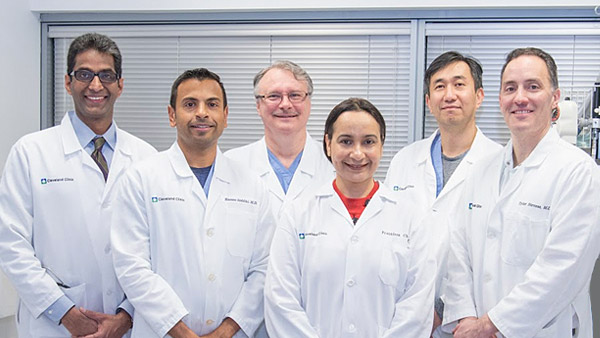
On behalf of Cleveland Clinic Advanced Endoscopy fellowship program, we welcome your interest in our program. Cleveland Clinic offers a comprehensive therapeutic endoscopy fellowship experience. Founded in 1985, it is arguably the first advanced endoscopic program in the United States and has produced several leaders in advanced endoscopic research and education.
This one-year program includes training in endoscopic ultrasound, ERCP, balloon enteroscopy, Barrett's ablative techniques, endoluminal stenting, and other therapeutic techniques such as complex stricture dilation.
Both the technical and cognitive aspects of endoscopy are emphasized. Fellows are educated on all facets of endoscopic practice, including proper indications, equipment and technology, quality indicators, varying technical approaches, and the recognition and management of complications.
A clinical research project is an essential and required component to the curriculum. Fellows may also spend time in our pancreas disease clinic, GI bleeding team, and esophageal diseases clinic based on their interest. A rich conference schedule includes management conferences and our multidisciplinary hepatopancreaticobiliary conference, and augments the clinical experience.
The faculty in our program come with a range of experiences. All our faculty are interested and invested in the education of our therapeutic trainees. We welcome your consideration of our program!
John J. Vargo, MD, MPH, AGAF, FACG, FACP, FASGE, Medical Director of Advanced Endoscopy
Miguel Regueiro, MD, FACG, AGAF, FACP, Chair, Gastroenterology, Hepatology & Nutrition
Curriculum
Cleveland Clinic advanced endoscopy fellowship program goals
The goal of our advanced endoscopy fellowship program is to train the best academic and clinical gastroenterologists to meet the future needs of our profession in patient care, teaching, and research. We are dedicated to training physicians who can lead our profession in this changing era of health care and research.
The primary means of training is on-site care of patients with digestive disease disorders over the one-year advanced endoscopy fellowship program in a supervised setting, which enables independent thought and evaluation of patients. Our fellows are exposed to patients in the in-patient and out-patient settings.
A major thrust of the advanced endoscopy fellowship program is to train fellows in the techniques of clinical investigation and endoscopic therapy. This experience will involve exposure to the research process by selection of a scientific question, protocol design and critique, IRB and regulatory processes, data collection, statistical analysis, and presentation. Fellows present their initial protocol to the endoscopy group for open discussion.
This document provides an overview of the advanced endoscopy fellowship training program including overall goals and objectives as well as specific goals and objectives for each rotation.
Overall goals:
- To provide skills necessary to understand, diagnose, and treat a wide range of complex gastrointestinal and biliary disorders.
- To develop proficiency in all advanced endoscopic procedures.
- To develop teaching ability for endoscopy.
- To provide a meaningful and stimulating clinical research experience.
Clinical Training & Mentorship
Clinical training
Our advanced endoscopy fellowship program provides education and training by three different modalities:
- Faculty mentorship.
- Didactic teaching by fellows and faculty.
- Independent study.
As delineated below, our curriculum offers excellent training in all of these core areas. By mastering these competencies, our graduates will be leaders throughout their career.
Overall goals:
- Assessment and management of acutely ill patients with gastrointestinal and liver disorders who are admitted to the hospital. Patient demographics consist of adult patients across all age ranges, ethnic backgrounds, and with acute and chronic disorders.
- Assessment and management of outpatients with various gastrointestinal and liver disorders. The patient mix includes adult patients across all age ranges, ethnic backgrounds, and with acute and chronic disorders.
- Effective interaction with primary care physicians and consultants both in the outpatient and inpatient settings.
- Develop proficiency in complex endoscopic procedures and associated interventions (endoscopic retrograde cholangiopancreatography and all interventions including cholangioscopy. endoscopic ultrasound, EMR, luminal stenting, balloon enteroscopy, Barrett’s ablative techniques, transluminal EUS guided interventions, management of pancreatic fluid collections). Fellows also get exposure to foregut ESD and bariatric endoscopy procedures which are performed routinely in our endoscopy unit.
- Learn the techniques of clinical investigation.
- Appropriate use of resources.
- Participation and presentation in quality assurance conferences.
The core curriculum of topics is covered over the one year cycle of the advanced endoscopy fellowship. Individual key subjects are reviewed by staff and fellows in formal didactic conferences. The finer points of management, pathophysiology, and diagnosis are formally reviewed during case management conferences, state-of-the-art lectures, and during case-based teaching in the hospital and clinics. These teaching methods address the ACGME six core competencies is listed below:
- Patient care.
- Medical knowledge.
- Practice based learning and improvement.
- Interpersonal and communication skills.
- Professionalism.
- Systems-based practice.
Our commitment is to train young physicians to a high level of clinical, academic, and systems competence, becoming professional leaders throughout their career in this rapidly changing field.
We perform high volume of advanced endoscopic procedures including innovative interventional endoscopic procedures.
Our average annual advanced endoscopic procedure volumes are:
- ERCP: 1300, >25 cholangioscopies, >900 biliary stent placements.
- EUS: >1500, FNA around 800.
- ESD: Upper >100.
- POEM: 69.
- Balloon enteroscopy: 180.
- Barrett’s ablative procedure: more than 220.
- Luminal stents: 120.
- EDGE ( EUS directed transgastric ERCP in Roux-en-Y patients): >15.
- Interventional EUS procedures requiring LAMS (pancreatic fluid collections, WOPN, gastrojejunostomy, biliary drainage): 90.
Mentorship
Each fellow is paired with a Staff Physician as their Advisor. Their role is to provide career counseling, ensure that each resident is developing well clinically, operating at the requisite skill level and filling leadership positions. More subtly, their role is to demonstrate a model for professionalism.
Research & Professional Development
The research opportunities at the Cleveland Clinic are outstanding – and thus all fellows are expected to be productive in clinical research throughout their fellowship. You will have access to our multiple institutional databases, electronic medical record which houses our massive clinical experience, and national databases.
All fellows are required to carry out a prospective research project as part of the advanced endoscopy fellowship program under the direction of an experienced mentor and in concert with other members of the advanced endoscopy group. This will usually be a clinical project but may also involve translational opportunities with Cleveland Clinic's Lerner Research Institute which has significant dollars in NIH funding. All projects will be conducted under the close supervision and mentoring of a staff member experienced in research. There is a broad spectrum in choice of topics.
Other opportunities for case reports, book chapters, other research projects and writing will be encouraged during the advanced endoscopy fellowship. A manuscript suitable for submission for publication must be submitted to the Program Director no later than June 1 of the year of the advanced endoscopy fellowship as a requirement for completing the advanced endoscopy fellowship.
These research months allow fellows the opportunity to pursue particular research in the Department. The bulk of the time on these rotations should be spent working on the research projects. One half day per week during this rotation is spent in the continuity care clinic and an additional half day may be spent in endoscopy. Presentation of research at regional or national meetings is strongly encouraged as the well as the preparation of a manuscript for submission to a peer-reviewed journal.
Research goals and objectives
- Develop an understanding of the processes required to perform clinical research.
- Formulate a specific hypothesis and design a protocol to test the hypothesis.
- Learn how to work with the IRB regarding regulatory affairs.
- Conduct a study.
- Use appropriate statistical analysis to analyze data.
- Present study results and submit a publication.
Each fellow then selects Staff Physician as their Research Mentor. Their role is to assist with developing research projects and publications.
Fellows travel to present research at national conferences is supported and fully funded, allowing you to make national contacts among leaders in the field. Activity in research ensures our fellows are not only up to date in their medical knowledge, but advance the field of Gastroenterology and Hepatology.
The advanced endoscopy group is highly prolific in presenting and publishing research with multiple podium and poster presentations and more than 50 publications in peer reviewed journals each year.
Our trainees and staff routinely present at national and international meetings like UEGW, JGES, Mexican Society of GI Endoscopy, ESGE, Indian Society of GI Endoscopy. Asia Pacific Digestive Week).
We have several ongoing, prospective, international multicenter collaborative studies and retrospective studies in our section.
Our academic and endoscopic procedure talent is showcased during several endoscopy related courses conducted in our endoscopy unit and animal lab throughout the year.
Rotations
Gastroenterology consult and acute bleeder service
The overall educational goal of this rotation for fellows is to develop consultative skills in the management of the hospitalized patient who presents with or develops GI symptoms or disease. The consult service is also responsible for emergency endoscopy of all patients with GI bleeding in the ICUs during regular working hours. Therefore fellows on the consult service will learn how to perform emergency endoscopies in the ICUs under the supervision of the attending physician.
Conferences
Monthly PB Live
PB Live is an online video/webcast education series for physicians focusing on pancreatic, biliary and advanced endoscopy case-based presentations. PB Live is a working collaboration between Cleveland Clinic and UPMC/University of Pittsburgh, with up to 10 national institutions participating monthly. Drs. Prabhleen Chahal and Tyler Stevens lead the series at Cleveland Clinic's main campus. The broadcast is on the third Friday of every month from 7-8 a.m.
Monthly Obesity Live
Obesity Live is an online video/webcast education series for physicians and surgeons focusing on multidisciplinary management of obesity in a case-based presentation format. Dr Roberto Simons Linares is co-leading the series at Cleveland Clinic's main campus. The broadcast is on the first Thursday of every month from 5:30-6:30 p.m. EST.
Visiting Professor Series
The Visiting Professor Series is comprised of a lecture from an internationally renowned faculty member in the field of endoscopy and an interactive lunch and "stump the chump" session.
2019
- Dr. Martin Freeman, University of Minnesota.
- Dr. Manuel Perez Miranda, Rio Hortega Hospital, Valladolid, Spain.
2020
- Dr. Vivek Kaul, University of Rochester.
- Dr. Gregory Cote, MUSC, Charleston.
- Dr. Allison Schulman, University of Michigan.
View Photos from our Monthly Advanced Endoscopy Conference
1
of
11
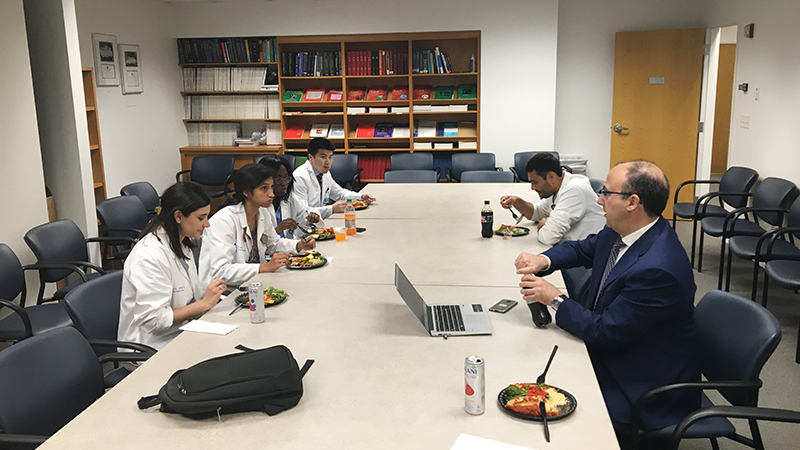
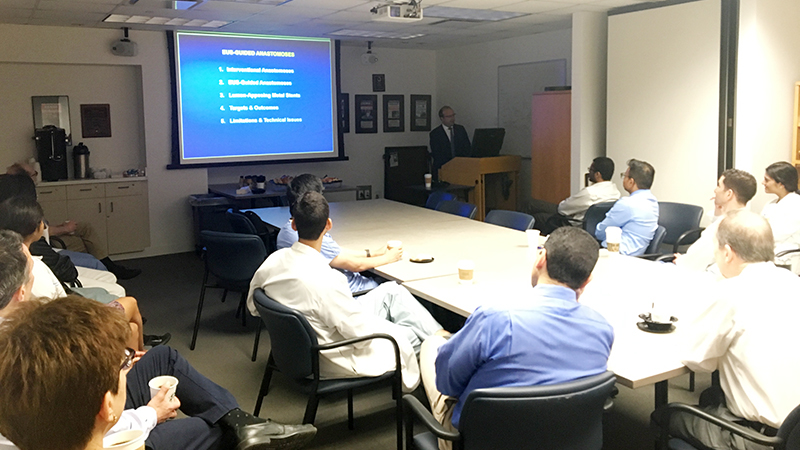
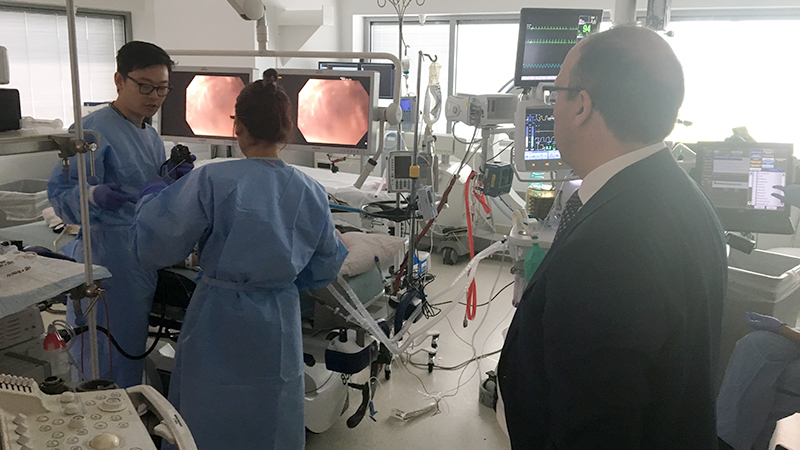
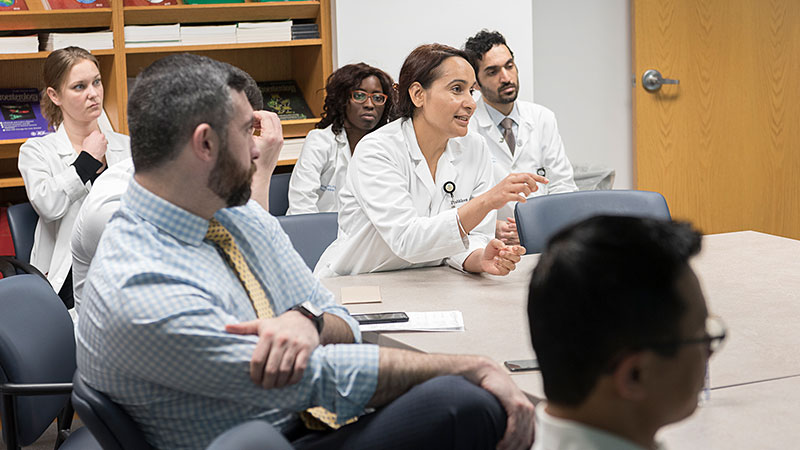
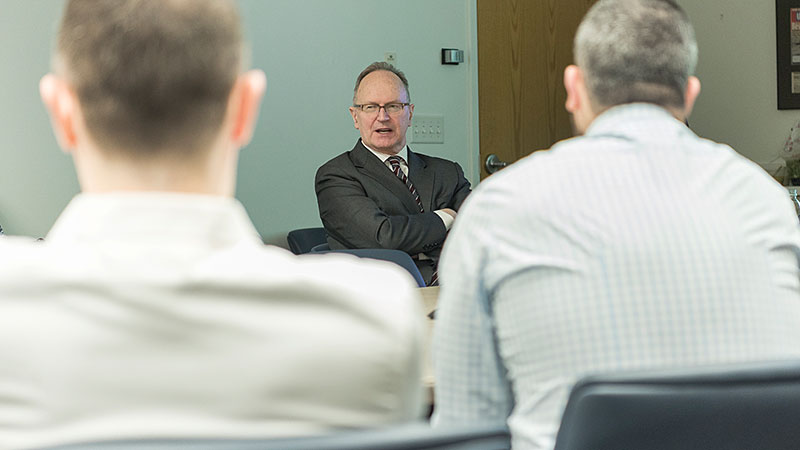
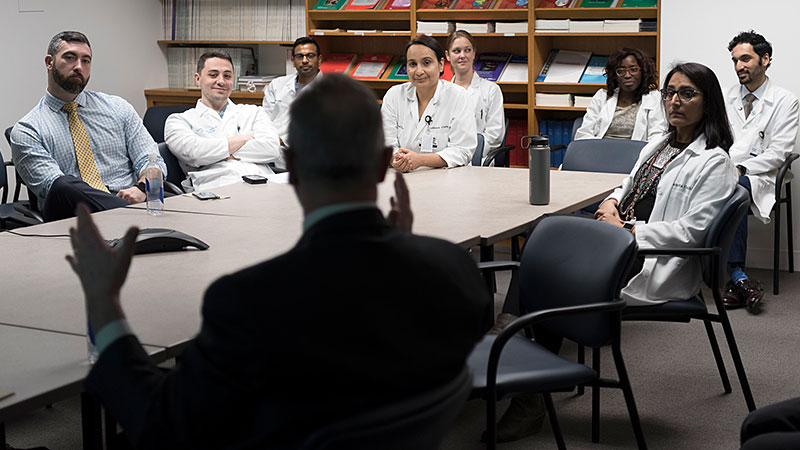
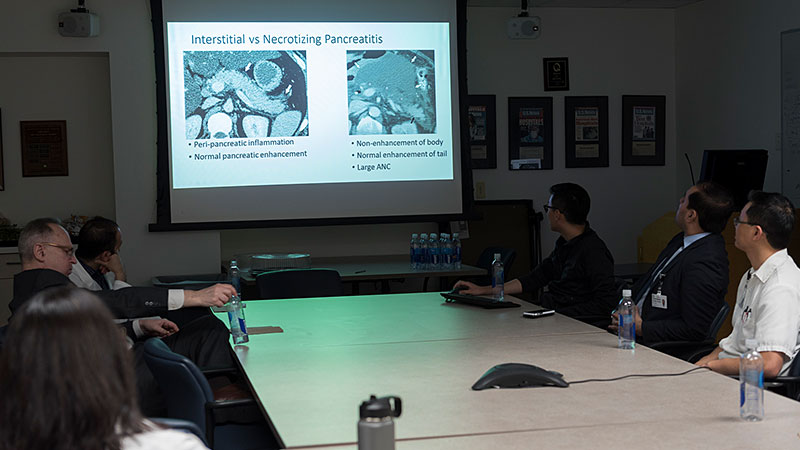
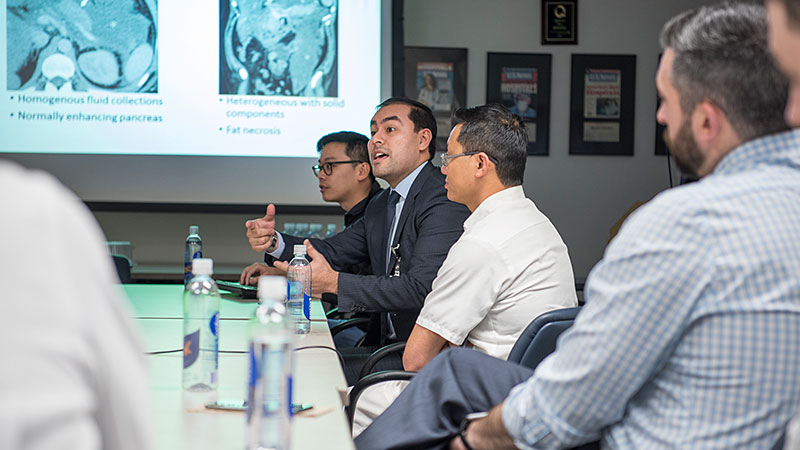
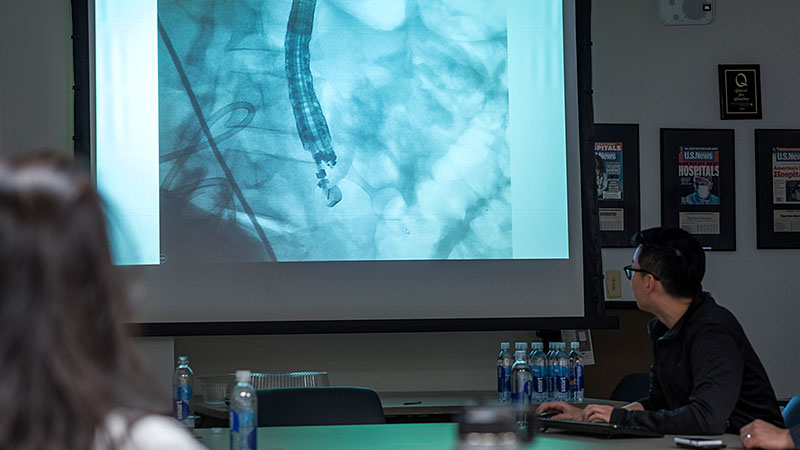
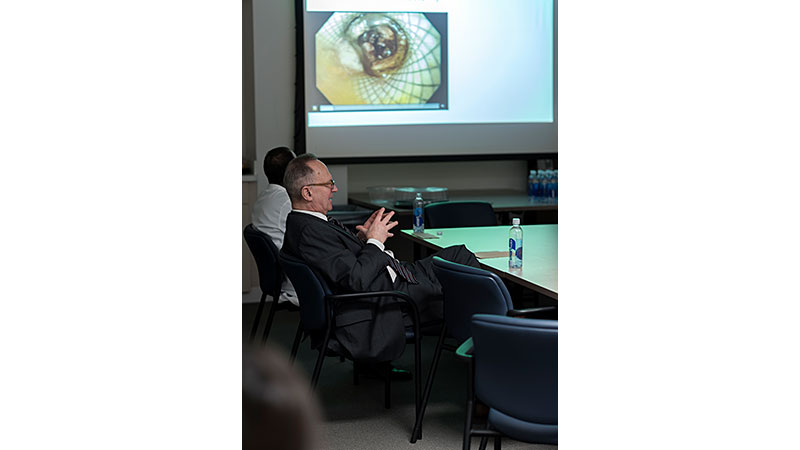
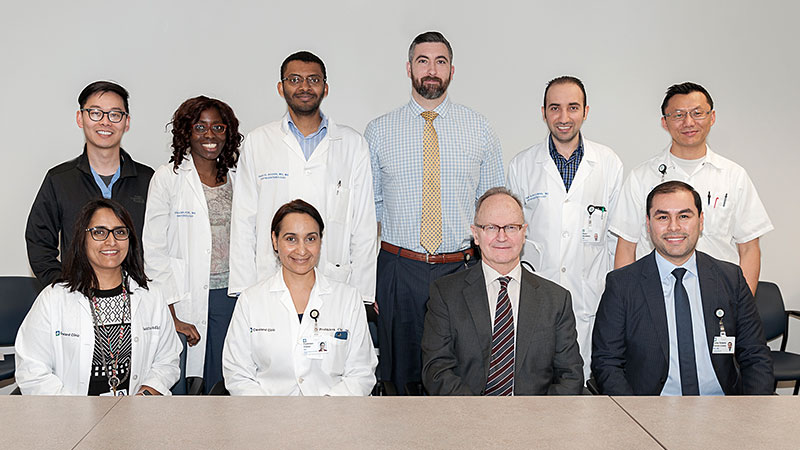
Clinical conferences
It is expected that the most significant aspect of the learning experience will come from "hands-on" management of patients, supported by case-based independent reading of textbooks and selected journal articles. A significant portion of the advanced endoscopy fellowship education process comes from participating in an environment which allows for and fosters divergent opinions and approaches to patient care. The Department conference and rotation format is designed to meet this expectation.
Morbidity and Mortality Conference
Each month the fellows report cases for the M&M conference. The conference faculty moderator selects cases for presentation based on their teaching merit, and moderates the discussion. The fellow who managed the patient presents the case and pertinent literature while focusing on clinical decision making, reasons for any complications and alternative management options., The main focus of the conference is improving clinical decision making to improve patient care.
Case Management Conference
Each fellow presents 30-minute management conferences at regular intervals throughout the academic year. This is a brief presentation that addresses diagnostic or management dilemmas that are debated amongst faculty and fellows. This conference is considered by many to be the highlight of our conference schedule.
State of the Art Conference
Each fellow presents a comprehensive, one-hour presentation on a specific topic of his/her choice using an extensive review of the literature. The fellows work with a faculty mentor in the development and synthesis of their presentation.
Gastroenterology Didactic Series
The academic year begins with a didactic core curriculum that reviews important topics in gastroenterology, hepatology and nutrition. Throughout the course of the academic year, distinguished faculty from the Digestive Disease Institute and other departments are invited to speak to fellows and faculty in various areas of interest.
Fellows Conference Series
This weekly series consists of four multidisciplinary areas:
- Radiology Rounds, designed to improve fellows ability to interpret basic radiology studies and determine which tests are applicable in specific clinical situations.
- Research Methodology helps fellows review the basic principles of clinical epidemiology and statistical design in order to critically interpret literature and elements of statistical design criteria.
- Pathology allows fellows to improve their ability to review and interpret histological specimens in an organ-based fashion from a variety of pathological conditions.
- Nutrition conference reviews the fundamentals of nutrition in a variety of pathological states including understanding concepts pertaining to parenteral and enteral nutrition, and obesity.
Hepatobiliary Management Conference
This is a multi disciplinary conference attended by members of the therapeutic endoscopy section, general surgery, diagnostic imaging, gastrointestinal oncology, and radiation oncology. Typically, a series of case management issues are presented with group discussion. Fellows currently on the endoscopy rotation are urged to attend.
Gastroenterology Journal Club
A journal club is held monthly at an external location. Articles are selected by faculty around a theme, and presented in a critical fashion by the fellows. These are discussed in a congenial atmosphere. Topics are rotated month to month.
Subspecialty Conferences
Each subspecialty holds its own conferences (IBD, Liver Transplant, HPB, Intestinal Transplant, Clinical Nutrition, etc.) These conferences are made available to all fellows that wish to attend.
Grand Rounds
These one-hour seminars by esteemed Cleveland Clinic and visiting faculty are wide-reaching presentations aimed at faculty, fellows, and residents. Presentations are on a broad range of topics, including clinical topic updates, world health, surgical history, etc. These are held monthly for Internal Medicine, General Surgery, and Transplant Center.
Fellows & Alumni
Current fellow
Mohannad Abou Saleh, MD
Gastroenterology Fellowship
Cleveland Clinic
Alumni career pathways
2021 graduate:
- Roberto Simons-Linares, MD – Cleveland Clinic, OH.
2020 graduate:
- Shelini Sooklal, MD – Kaiser Permanente, Seattle, WA.
2019 graduate:
- Feng Li, MD – Kaiser Permanente, Los Angeles, CA.
2018 graduate:
- Aravind Sugumar, MD – Southwest Gastroenterology LCC, Goodyear, AZ.
2017 graduate:
- Matheus Franco, MD – Cancer Institute of São Paulo, University of São Paulo, Brazil.
2016 graduate:
- Brad Confer, DO – Geisinger Medical Center, Danville, PA.
Testimonials
"Getting my advanced endoscopy training at the Cleveland clinic was one of the best decisions i made. Every one from the physician to the nurses, techs and schedulers made me feel welcome and part of the team. If you want the best training in the country in a stimulating and nurturing environment look no further!"
- Aravind Sugumar, MD
"The AE training at CCF was such a great experience. First of all, I was exposed to a broad range of advanced endoscopic procedures, including EUS and ERCP, under supervision of an excellent world-class team of advanced endoscopists. This training enabled me to perform advanced procedures with confidence at an independent level. During the training I also learnt a lot about researching with mentor and others from the team. We published some articles and I presented our results at DDW as well. It was great for my CV. Second, the environment at the CCF was amazing. I'm very thankful to all doctors, nurses, and caregivers. They made my life easier there, I made good friends for life. Finally, Cleveland was a good home. I had a really great time there and enjoyed a lot the city, restaurants, museums, skiing, and its sports teams."
- Matheus Franco, MD
"Cleveland Clinic is an amazing place to train for AEF for a variety of reasons:
- The depth and breadth of procedures was very important to me. You will see everything from the most routine stone cases to the most complicated hilar strictures. Furthermore, the procedure volumes are outstanding. You will certainly be exposed to the most cutting edge procedures including ESD, POEM, EUS guided rendezvous, EUS guided gallbladder/biliary drainage procedures and EUS guided gastro-jejunostomy.
- Having a large number of interventional endoscopy staff was also important because you learn different subtle tips/tricks from a multitude of experts which ultimately has benefited me in independent practice.
- There was an animal lab which I was able to utilize and begin to learn the basics of ESD and POEM."
- Bradley Confer, MD
Staff Physicians
Locations
Cleveland Clinic
Cleveland Clinic was founded in 1921 by George Crile Sr., a general and endocrine surgeon; Frank Bunts, a neurosurgeon; William Lower, an urologist; and John Phillips, an internist. It was a new kind of medical center: a physician-led, not-for-profit, integrated hospital and group practice, equally dedicated to patient care, research, and education. Cleveland Clinic quickly became a world renowned training hospital, medical school and research institute, known for offering the most advanced medical care.
Cleveland Clinic's main campus consists of 41 buildings and more than 85 operating rooms, with constant expansion and renovation. The Gastroenterology offices are on the third floor and fifth floor of the A building (desk A30 and A50) in the Digestive Disease Institute.
Q3: new, state-of-the-art endoscopy unit
The Digestive Disease Institute’s advanced endoscopy unit, located in Glickman tower on Cleveland Clinic’s main campus, emphasizes both safety and quality. The 15,000-square-foot facility was built to improve both access and patient experience. The expansion doubled the number of therapeutic endoscopy suites for performing endoscopic retrograde cholangiopancreatography (ERCP), endoscopic ultrasound (EUS) and deep enteroscopy. Specialized fluoroscopic equipment will allow for the next generation of 3-D cholangiography, which is available at only a handful of units nationally.
The unit was designed to improve patient satisfaction and features private recovery rooms with TVs and seating for family members. It will help maximize communication between patients and caregivers and enable close interaction with the staff from other specialties, including anesthesiology, hepatobiliary surgery, colorectal surgery, thoracic surgery, oncology and radiation oncology, during treatment.
“This expansion increases our ability to handle additional volume to speed up diagnosis and treatment of patients.”
– John Vargo, MD, MPH
Cleveland Clinic is a large facility, how do I find my way around?
While Cleveland Clinic has a large campus, it is easily walkable from the visitor parking garages and the two on campus hotels: the InterContinental Hotel and the InterContinental Suites. Cleveland Clinic is immediately adjacent to the University Circle Neighborhood, home of the Case Western Reserve University, the Cleveland Orchestra, and the Cleveland Museum of Art. Cleveland Clinic is centrally located and accessible from the downtown, east, and west side residential neighborhoods.
Application Information
What are you looking for in an applicant?
We are looking for outstanding individuals to immerse in a high volume environment that offers high quality, scientifically advanced care in an economically savvy environment. We seek the most promising physicians as demonstrated leadership abilities, academic productiveness, knowledge base, and positive personal qualities among applicants from all backgrounds.
What is your application process?
Cleveland Clinic has minimum requirements for fellowship application and employment, all of which are all required in the standard ERAS application. We have no secondary application form. We review every submitted application completely and carefully, and a selected group is offered on-site interviews.
What are your fellows' employment benefits?
Residents are Cleveland Clinic employees with standardized salaries and other benefits.
What VISAs are supported by Cleveland Clinic?
- Clinical Programs: For graduate medical education purposes (residency, fellowship and clinical research fellowship), Cleveland Clinic will accept H-1B temporary worker visas. International students enrolled in U.S. medical schools may use the post-graduate year of Optional Practical Training (OPT) for the first year of residency training. Information on this process should be obtained from the Designated School Official (DSO) at the medical school. Cleveland Clinic does not sponsor immigrant (permanent resident) petitions for research or clinical trainees (residents, clinical fellows, clinical research fellows, research fellows or postdoctoral fellows).
- Research Programs: The H-1B or F-1 student (sponsored by a U.S. college or university) with employment authorization are accepted by Cleveland Clinic for research purposes. Cleveland Clinic does not sponsor immigrant (permanent resident) petitions for research or clinical trainees (residents, clinical fellows, clinical research fellows, research fellows or postdoctoral fellows).
Contact Us
Gastroenterology Education Coordinator
Cheryl Borowski
Gastroenterology Education Coordinator
216.445.7204
Fax: 216.636.2508
borowsc@ccf.org
External Rotations
Evelyn Delong
GME Coordinator
216.444.9989
delonge@ccf.org
International Physician Services / Visa
Janice M. Bianco
Manager, International Physician Services
Responsible Officer, Exchange Visitor Program
216.445.7681
biancoi@ccf.org
Observerships / CIME
Graduate Medical Education
Main Office
216.444.5690
800.323.9259
Fax: 216.444.6112
Cleveland Clinic Operator
216.444.2200
Living in Cleveland
Cleveland, a mid-sized city located on Lake Erie, features a host of cultural attractions, recreational activities, major sporting events and an exploding culinary scene. Cleveland is home to the second largest theater district in the U.S., a park system featuring 23,700 acres in 18 reservations, and is the birthplace of rock ’n’ roll, home to the Rock ‘n’ Roll Hall of Fame and Museum. Cleveland Clinic is located near the University Circle area, which is the cultural epicenter of Cleveland. This area features Severance Hall and the world-renowned Cleveland Orchestra, the Cleveland Museum of Art, several other museums, and Case Western Reserve University. Downtown Cleveland, home to all major sports venues and an exploding culinary scene, is approximately two miles from Cleveland Clinic’s main campus.